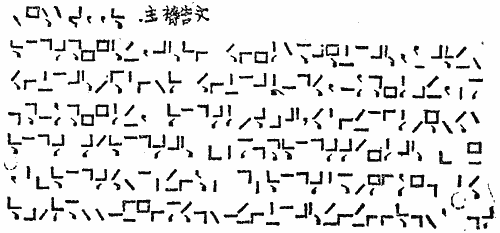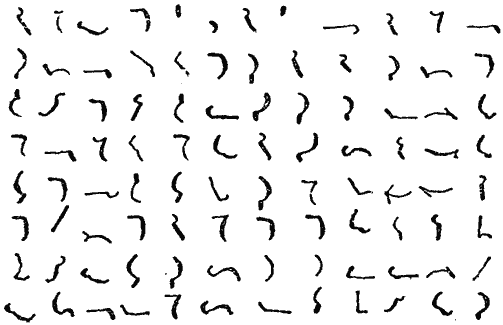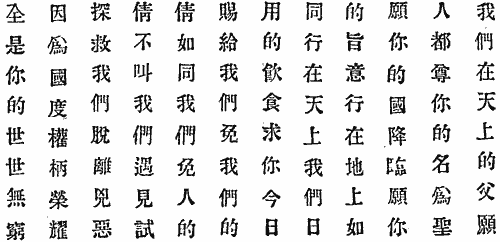The Lord's Prayer in Mandarin Chinese
1. In Roman Alphabet, according to Sir Thomas Wade's standard spelling. This requires to be altered to suit each dialect in every Province.
Wo3 mên1 tsai4 t'iên1
shang4 ti1 fu4,
yüan4 jên2 tu1 tsun1
Ni3 ti1 ming4 wei4 sheng4,
yüan4 Ni3 ti1 kuo2 chiang4
lin2,
yuan4 Ni3 ti1 chih3 yi4
hsin2 tsai4 ti4 shang4,
ju2 t'ung2 hsing2 tsai4 t'ien1
shang4.
Wo3 men1 jih4 yung4 ti1
yin3 shih2,
chin1 jih4 t'su4 yü3 wo3
mên1,
miên3 wo3 mên1 ti1
chai4,
ju2 t'ung2 wo3 mên1 mien3
jên2 ti1 chai4.
Pu4 chao4 wo3 mên1 yü4
chiên4 shih4 t'an4,
chiu4 wo3 mên1 t'o1 li2
hsiung1 ê4,
yin1 wei1 kuo2 tu4 c'hüan1
ping3 jung2 yüeh4 c'hüan1
shih4 ni3 ti1
shih4 shih4 wu2 c'hiung2 a1
mên1.
2. In the Numeral Type, which can be read with equal facility in all Provinces of Mandarin China -- which comprises eight-ninths of the whole of China -- without any alteration, except, in certain Provinces, the addition of a very simple symbol to denote a fifth tone. (See note on page 132.)

3. In Shorthand for Numeral Type.

4. The Lord's Prayer in Mandarin Chinese as Pronounced at Peking.

